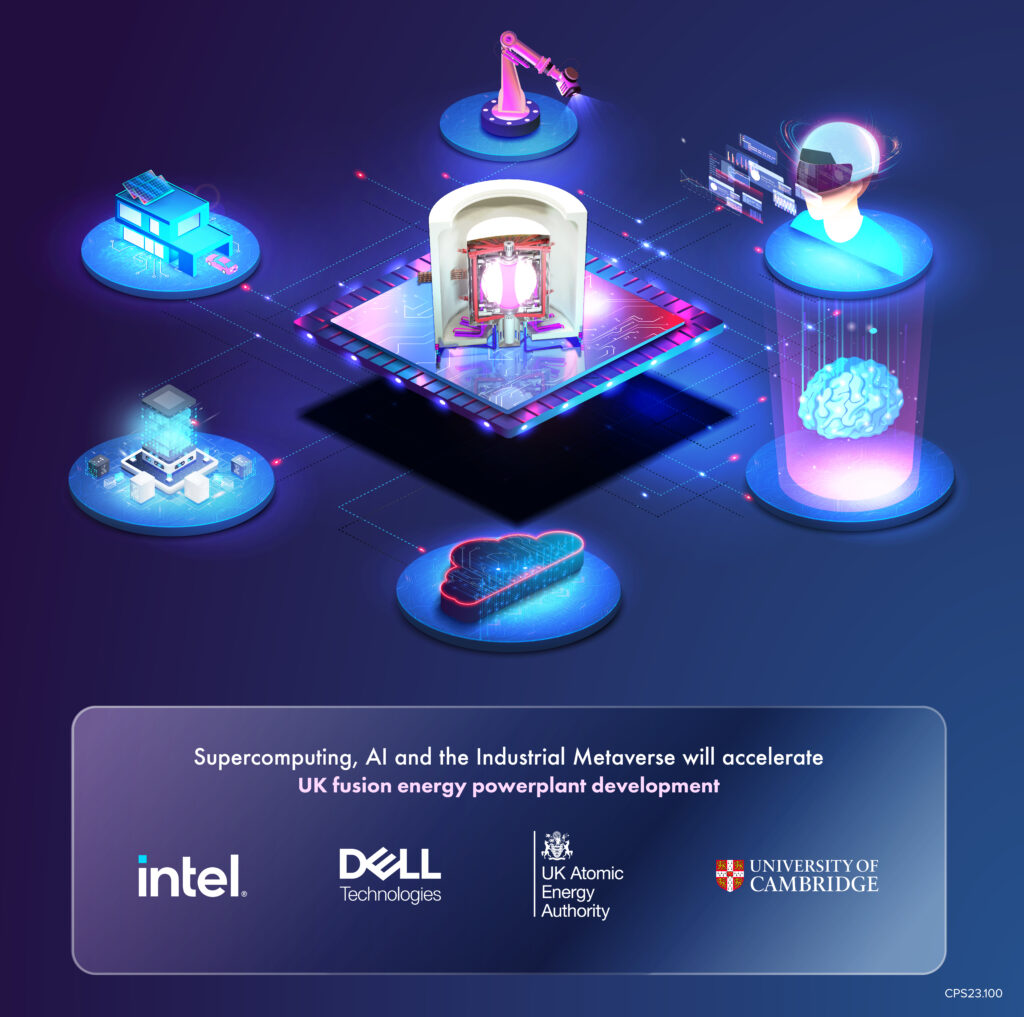UK Atomic Energy Authority (UKAEA) and Cambridge Open Zettascale Lab
Fusion energy is often seen as the ultimate solution for sustainable and virtually unlimited power. However, the development of a functioning fusion power plant that can supply energy to the grid is still several years away. To engineer this new type of power plant, advanced tools and extensive modeling and simulations are required, while fusion research and technology continue to progress.
In order to accelerate the engineering process and ensure future adaptability, the UK Atomic Energy Authority (UKAEA) and the Cambridge Open Zettascale Lab are employing supercomputing and a “digital twin” or prototype of the STEP (Spherical Tokamak for Energy Production) machine design.
Working within the industrial metaverse, a digital representation of an industrial environment, the UKAEA team can modify their design as new information becomes available and technologies evolve. The supercomputer at the Cambridge Open Zettascale Lab utilizes Dell PowerEdge servers with 4th Gen Xeon processors to handle the vast amounts of modeling and simulations required for fusion research.
To overcome one of the major obstacles in simulation functionality and performance code portability oneAPI is utilized. oneAPI enables developers to use a single codebase for deploying applications across multiple architectures. Intel oneAPI tools and optimized AI frameworks deliver high performance for deep learning and molecular dynamics. As a oneAPI Center of Excellence, the Cambridge Open Zettascale Lab aims to expand its application set to encompass engineering, fusion materials, and plasma simulation.

Another potential challenge in fusion research is the speed of storage, particularly when dealing with large simulations running across thousands of graphics processing unit (GPU) nodes, followed by the transfer of massive amounts of data for fast post-simulation analysis. A single plasma turbulence simulation can generate hundreds of petabytes of data within a very short timeframe.
To address this, Intel DAOS (Distributed Asynchronous Object Storage) is employed. DAOS is an open-source, software-defined, scale-out object store that offers high bandwidth, low latency, and high I/O operations per second (IOPS) storage containers for high-performance computing (HPC) applications. In fusion research, DAOS provides a fast and efficient pathway for analysis and calculations that need to occur within extremely tight time constraints.
Overall, through the utilization of supercomputing, digital twins, advanced tools like oneAPI, and high-speed storage solutions like Intel DAOS, the UKAEA and the Cambridge Open Zettascale Lab aim to accelerate the engineering of fusion energy and ensure progress is future-proofed. The ultimate goal is to deliver access and capability to all those involved in achieving commercial fusion energy, thereby addressing the urgent need for energy security and combating climate change.
The ability to alter the environment
There is to make exascale feasible and zettascale feasible.
The goal of the Cambridge Open Zettascale Lab is to enable innovation in nascent zettascale technologies while bringing exascale to reality.
The Zettascale Lab, established in partnership with the University of Cambridge, Pembroke College, Intel, and Dell Technologies, allows global technology leaders and specialists to investigate, test, and develop the upcoming generation of high-performance computers.
As of November 1, 2023, Cambridge Open Zettascale Lab houses Dawn, the UK’s fastest AI supercomputer. Dawn, built by Cambridge’s COZL and Research Computing Services, Intel, and Dell Technologies, was unveiled by the UK government on November 1, 2023, during Prime Minister Rishi Sunak’s AI Safety Summit.
The Cambridge Open Zettascale Lab
The term “Zettascale” describes the upcoming generation of supercomputers.
Zettascale systems will integrate lightning-fast data storage and analytics with high performance computation for training artificial intelligence and simulation.
Scientists, engineers, and medics will be able to conduct the cutting-edge research and development required to start resolving the world’s pressing issues thanks to these capabilities.
It can create new materials and renewable energy solutions, improve the knowledge of the universe, and create and provide data-driven healthcare and tailored medicine with zettascale-class systems.
- In 2025, 463 exabytes of data will be produced daily.
- Supercomputers account for 40% of the HPC market as a whole.
- In 2025, 26 exascale computer systems will be operational.
- 1 The first zettascale system is expected to be put together around 2035.



[…] Storage Architecture (ESA)-based vSAN 8.0 is an improved ReadyNode infrastructure offering from Dell, Intel, and VMware. Improved performance and efficiency are provided by this release to cater to the […]
[…] most frequent inquiries to Dell and Intel are about BIOS security. This shouldn’t come as a surprise because, in recent years, BIOS and […]
[…] Dell Technologies and Intel are working together to deliver AI solutions for clients at every AI stage. The PowerEdge with Xeon and Gaudi will handle AI workloads from large-scale training to base-level inferencing. […]